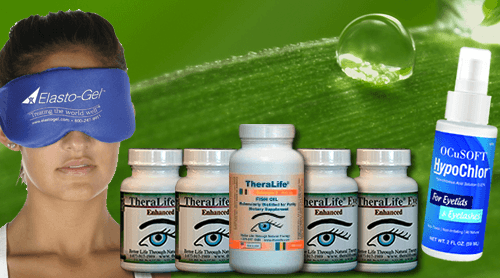As a Sjogren’s patient, managing stress can be effectively achieved with TheraLife’s comprehensive range of products. TheraLife offers natural solutions aimed at enhancing eye health and overall well-being, specifically catering to conditions such as dry eyes, blepharitis, and other eye-related concerns. Their products are formulated to address underlying inflammation and moisture balance, providing relief and comfort for individuals with Sjogren’s syndrome.
TheraLife’s Eye Enhanced supplements support tear production and reduce dependency on artificial tears, while their anti-inflammatory diet recommendations complement the holistic management of dry eyes. Additionally, TheraLife provides guidance on lifestyle adjustments and dietary changes that can further alleviate symptoms associated with Sjogren’s and related conditions.
By exploring TheraLife’s offerings and integrating their products into your routine, you can achieve effective stress management and improve your quality of life. Collaborating with healthcare providers ensures individualized care and maximizes the benefits of TheraLife’s tailored solutions.
Key Takeaways
- Mind-body therapies like yoga and tai chi effectively reduce stress and improve flexibility in Sjogren’s patients.
- Deep breathing techniques, such as box breathing, help reduce anxiety and stabilize physiological states.
- Adaptogens, including ashwagandha, aid in balancing cortisol levels and promoting relaxation.
- An anti-inflammatory diet rich in omega-3s and antioxidants supports stress management and immune health.
- Cognitive-behavioral therapy and mental health resources provide essential support for anxiety and depression management.
Mind-Body Therapies
Although managing stress is essential for Sjogren’s patients, mind-body therapies offer a promising approach that addresses both physical and psychological well-being.
Engaging in mindful movement, such as yoga and tai chi, facilitates stress reduction by harmonizing the sympathetic and parasympathetic nervous systems. These practices not only alleviate anxiety but also improve flexibility, muscle strength, and sleep quality—key factors in managing Sjogren’s symptoms. Personalized sessions can be tailored to your specific needs, optimizing therapeutic outcomes. Clinical evidence underscores the benefits of integrating these therapies with conventional treatments, showcasing improvements in symptomatology. Additionally, managing hormone imbalances can help mitigate flares and improve overall health, further enhancing the effectiveness of mind-body therapies. Incorporating an autoimmune diet alongside mind-body therapies can further aid in reducing inflammation and managing symptoms effectively.
Deep Breathing Techniques
Deep breathing techniques offer significant benefits for stress relief, particularly by modulating the autonomic nervous system to reduce anxiety naturally. By incorporating diaphragmatic breathing and nasal breathing into your routine, you can harness physiological changes that promote relaxation and improve mood. Just as yoga poses like the Bridge Pose help alleviate stress and anxiety through physical postures, deep breathing can similarly support mental tranquility. Consistent practice of these techniques has been shown in clinical studies to lower stress markers such as heart rate and salivary cortisol levels, providing a sustainable approach to managing anxiety. Additionally, the use of immuno-modulators in managing autoimmune conditions like Sjogren’s can also contribute to overall stress reduction by minimizing immune system flare-ups.
Benefits of Deep Breathing
When considering the benefits of deep breathing, it’s important to recognize its profound physiological impacts, which are supported by scientific evidence. Breathing exercises play an essential role in stress management by lowering blood pressure and heart rate. They also reduce stress hormones, like cortisol, in the bloodstream. This can lead to enhanced immune function and increased oxygen levels, positively impacting physical energy by reducing lactic acid build-up. Deep breathing also enhances mood, alleviates anxiety, and triggers the relaxation response, all contributing to better emotional well-being. For Sjögren’s syndrome patients, these exercises assist in managing fatigue and stress, offering a complementary therapy alongside conventional treatments. Symptoms of Sjögren’s syndrome, such as fatigue and joint pain, can often overlap with other conditions, making stress management techniques like deep breathing crucial. Up to 20% of Sjögren’s syndrome cases exhibit respiratory symptoms, which can increase significantly with systematic investigation, making deep breathing an even more vital practice. Clinical trials and physiological measurements further substantiate these benefits, making deep breathing an integral component of holistic care.
Techniques for Relaxation
Exploring various deep breathing techniques provides Sjögren’s patients with effective tools to manage stress and improve overall well-being. Techniques like box breathing, which involves mindful movement through breathing rhythms of inhale, hold, exhale, and hold, can stabilize your physiological state. The 4-6 breathing method, enhancing heart rate variability, is particularly beneficial for autoimmune patients. Adjusting the 4-4-4 breathing to shorter intervals guarantees accessibility. It’s important to prioritize a balanced intake of nutrients to support overall health and complement stress management strategies. Swallowing exercises, such as closure of the larynx exercises, can also strengthen laryngeal muscles, aiding in comprehensive stress management. To optimize benefits, practice regularly and incorporate into daily routines. Prepare by eliminating distractions and finding a comfortable position. Consistency is key—perform exercises at the same time each day. Visual guides can help maintain focus and rhythm. Integrating these exercises with yoga enhances relaxation, offering a thorough approach to stress management.
Reducing Anxiety Naturally
Although anxiety is a common challenge for Sjogren’s patients, employing deep breathing techniques can greatly alleviate symptoms. Integrating these methods into your daily routine can enhance relaxation and manage stress effectively. Techniques such as Deep Breathing and the 4-7-8 Technique focus on expanding your belly with air, fostering calm. Regular practice in a quiet, distraction-free setting is essential. Comfort is crucial; therefore, it’s important to find a position like lying on your back or sitting in a supportive chair to facilitate deep breathing. To maximize benefits, consider combining deep breathing with mindfulness practices or herbal remedies. Sjogren’s patients often face diagnosis challenges due to overlapping symptoms with other conditions, making stress management even more vital.
- Deep Breathing: Fill your belly, not just your chest, with air.
- 4-7-8 Technique: Breathe in for 4 seconds, hold for 7, exhale for 8.
- Equal Time Breathing: Match inhalation and exhalation duration.
- Breath Focus: Use mental imagery and phrases for calmness.
- Consistency: Practice daily for best stress relief.
Relaxation With Adaptogens
Incorporating adaptogens into your regimen can naturally soothe the adrenal glands and help lower cortisol levels, offering significant stress relief for Sjögren’s patients. Evidence suggests that adaptogenic botanicals such as St. John’s Wort and saffron may positively impact depression-related symptoms, which are common in Sjögren’s syndrome. The AIP diet can also be considered to manage inflammation and improve overall health, as it focuses on eliminating trigger foods and promoting nutrient-dense options. Relaxation techniques like meditation and deep breathing can also play a crucial role in managing stress and promoting better sleep for those dealing with Sjögren’s.
Soothe Adrenals Naturally
When managing adrenal health, particularly for those with Sjögren’s syndrome, utilizing adaptogens can provide a natural method of relaxation and stress relief. You should consider integrating adrenal herbs and natural supplements like Panax ginseng and Ashwagandha into your routine. These adaptogens can enhance energy levels and support adrenal function by modulating the hypothalamic-pituitary-adrenal (HPA) axis. Acanthopanax senticosus and Rhodiola crenulata can help reduce stress and combat fatigue, promoting overall adrenal health. Schisandra chinensis is known for its stress-reducing properties, providing balance and stability. Adaptogens must meet specific criteria, including providing non-specific benefits and counteracting stress impacts. Individuals with Sjögren’s syndrome often experience extreme fatigue, making stress management an essential part of overall treatment.
- Panax ginseng: Enhances energy, improves sleep
- Ashwagandha: Balances stress, relaxation
- Rhodiola crenulata: Fights fatigue, boosts performance
- Acanthopanax senticosus: Stress reduction
- Schisandra chinensis: Supports equilibrium
Lower Cortisol Levels
Managing cortisol levels is essential for individuals with Sjögren’s syndrome, as chronic stress can exacerbate symptoms and lead to disease flares. Adaptogens are your allies in regulating cortisol fluctuations and promoting stress reduction. These natural substances support adrenal function and enhance your body’s resilience to stress. By incorporating adaptogens into your routine, you can experience improved mental clarity, reduced fatigue, and enhanced overall well-being.
Early detection of ocular symptoms is crucial for preventing long-term damage; all RA patients should be evaluated for ocular involvement regardless of symptoms.
| Benefit | Description |
|---|---|
| Cortisol Regulation | Helps maintain balanced cortisol levels, reducing long-term stress effects. |
| Stress Management | Supports effective stress management, both short and long term. |
| Fatigue Reduction | Combats fatigue, boosting mental performance and mood. |
| Adrenal Support | Stimulates adrenal glands, maintaining balance during stress. |
| Improved Performance | Enhances physical and mental performance under stress. |
Integrating adaptogens can be transformative in managing Sjögren’s syndrome.
Engaging Mental Activities
Engaging in mental activities is essential for stress relief in Sjogren’s patients. Incorporating cognitive exercises into your routine can greatly enhance your mental agility and alleviate stress. While these activities are beneficial, it is important to listen to the body to determine the appropriate type and intensity of mental exertion, similar to physical exercise management. Brain games like crosswords and puzzles are beneficial for challenging your cognition and improving focus. Reading and learning new skills can maintain mental sharpness while reducing fatigue. Problem-solving activities, such as strategy games, foster cognitive function. Incorporating memory training exercises can also mitigate mental fatigue, enhancing overall cognitive resilience. Creative activities like drawing or crafting provide an outlet for stress relief and mental stimulation. Engaging in activities that promote cognitive function can also contribute to better management of stress, which is vital for maintaining overall well-being.
Eye and Throat Moisturization
As you engage in activities that sharpen your mind and alleviate stress, it’s equally important to address physical symptoms of Sjogren’s syndrome, such as dryness of the eyes and throat.
Effective eye lubrication strategies include using artificial tears and punctal plugs to retain moisture. Moisture chamber goggles and humidifiers create environments that help maintain eye hydration. Omega-3 supplements may also improve tear quality. Adequate water intake is crucial since hydration directly impacts eye moisture levels, ensuring better overall comfort. Chronic dry eyes can result from autoimmune diseases that may exacerbate the symptoms of Sjogren’s syndrome.
For throat hydration methods, frequent sips of water or herbal teas are beneficial, along with saliva substitutes and sugar-free chewing gums containing xylitol. Prescription medications like pilocarpine can enhance saliva production.
Herbal remedies such as aloe vera juice and slippery elm offer additional relief by soothing and coating oral mucous membranes efficiently.
Anti-Inflammatory Diet Tips
Though adopting an anti-inflammatory diet can seem intimidating, it’s essential for alleviating symptoms associated with Sjögren’s syndrome. Incorporating specific foods and spices can greatly reduce inflammation. Start by adding whole grains like oatmeal and brown rice to your meals for their fiber-rich benefits. Anti-inflammatory spices such as garlic, ginger, and turmeric can further help in managing symptoms. Omega-3 rich foods like salmon and mackerel provide essential fatty acids, vital for reducing inflammation. Fermented foods, such as yogurt and kefir, are rich in probiotics, which support gut health and can help reduce inflammation.
Consider these tips:
- Berries: Rich in antioxidants, they help combat inflammation.
- Leafy greens: Spinach and kale support immune health.
- Cruciferous vegetables: Broccoli and cauliflower reduce joint pain.
- Avoid processed foods: Minimize packaged food intake.
- Limit sugar: Prevent inflammation by reducing sugary foods.
Incorporate these dietary changes to manage symptoms effectively.
Sleep Optimization Strategies
When optimizing sleep for those with Sjögren’s syndrome, a structured approach is essential due to the disorder’s potential to disrupt restful slumber.
Establishing a consistent sleep schedule enhances circadian rhythm regulation. Optimize the sleep environment by maintaining a cool, dark, and quiet bedroom with blackout curtains and supportive bedding.
Initiate a calming bedtime routine by engaging in pre-sleep activities like reading or taking a warm bath to signal your body it’s time to relax. Eliminate distractions by removing electronic devices from the bedroom. Dim lights an hour before bed to support melatonin production.
If dryness causes discomfort, use eye drops and nasal moisturizers. Consider cognitive behavioral therapy to address persistent sleep disturbances and improve overall sleep quality.
Benefits of Physical Activity
Engaging in regular physical activity offers numerous benefits for individuals with Sjögren’s syndrome.
Aerobic exercise and resistance training are both essential in enhancing your overall well-being.
Aerobic exercise boosts cardiorespiratory fitness, optimizes VO2max, and alleviates fatigue, all while maintaining stable disease activity.
Resistance training improves functional capacity, emotional health, and energy without adverse effects.
It also enhances your subjective perception of disease activity.
- Enhances cardiorespiratory fitness and VO2max
- Alleviates fatigue and maintains disease stability
- Improves physical and mental quality of life
- Reduces stress and elevates mood through endorphin release
- Increases functional capacity and emotional health
Incorporating these activities into your routine can be transformative, promoting physical fitness, reducing stress, and enhancing quality of life.
Massage and Acupuncture
Massage and acupuncture are two complementary therapies that may provide relief for Sjögren’s syndrome patients.
Massage techniques, like myofascial release, target muscle relaxation and promote blood circulation, which reduces pain and inflammation in joints and tendons. This therapy is particularly beneficial for managing chronic rheumatologic pain by alleviating tissue restrictions through passive range of motion techniques.
On the other hand, acupuncture targets specific acupuncture points to address dryness, fatigue, and pain. Techniques like twirling and thrusting may modulate inflammation and improve symptoms, although results can vary.
Integrating these therapies with conventional treatments offers a holistic approach, enhancing overall symptom management. However, individualized care and continuous monitoring are essential to guarantee efficacy and minimize potential risks.
Mental Health Resources
Although managing the physical symptoms of Sjögren’s syndrome is essential, addressing mental health is equally important to enhance overall well-being.
Accessing appropriate mental health support can greatly alleviate anxiety and depression, which are prevalent in this patient population. Therapy options like cognitive-behavioral therapy can effectively treat fatigue and sleep disturbances, providing a structured approach to mental health care.
Additionally, exploring online resources can broaden your understanding and access to support.
- Sjogren’s Advocate: Offers lists of support groups and clinical resources.
- SAMHSA: Provides 24/7 confidential mental health services.
- Every Woman Over 29: Suggests nutritional strategies for mental health.
- Onderzoek Met Mensen: Highlights cognitive-behavioral therapy studies.
- Sjögren’s Syndrome News: Updates on mental health-related research.
Frequently Asked Questions
How Can Sjogren’s Affect Daily Life and Work?
You’ll notice Sjogren’s impacts daily life and work markedly.
Fatigue management becomes essential as symptoms like chronic pain and brain fog interfere with activities and productivity.
Workplace adaptations might include flexible hours or ergonomic workspaces to accommodate physical limitations.
Evidence shows that many patients alter their work schedules or roles due to cognitive impairments.
It’s vital to understand these challenges and implement strategies for maintaining function and quality of life.
Are There Specific Environmental Factors That Worsen Sjogren’s Symptoms?
Imagine your body as a finely tuned instrument, where climate conditions and air quality are the strings that can either harmonize or create discord.
Clinical evidence shows that poor air quality, such as pollution, exacerbates Sjögren’s symptoms. High humidity, above 60%, can worsen respiratory issues.
The exposure to UV light acts as a trigger, further stressing your system. Maintaining ideal environmental conditions is essential to managing Sjögren’s effectively.
What Role Does Hydration Play in Managing Sjogren’s Syndrome?
Hydration plays a vital role in managing Sjogren’s syndrome. You should prioritize fluid intake to mitigate symptoms like dry mouth and eyes.
Ensuring hydration benefits your saliva and tear fluid production, which contain essential electrolytes and enzymes. Regular water consumption and electrolyte-rich drinks can help maintain balance and prevent exacerbation of symptoms.
Clinical evidence suggests that maintaining ideal hydration can reduce complications like dental cavities and eye infections associated with Sjogren’s.
How Does Sjogren’s Syndrome Impact Dental Health?
Sjögren’s syndrome markedly impacts dental health by increasing the risk of tooth decay due to reduced saliva, which is essential for maintaining oral hygiene.
The lack of saliva enhances plaque buildup, leading to gingivitis and periodontitis. Patients often experience oral infections like candidiasis.
Implement topical fluoride and salivary stimulation strategies to combat these issues. Regular dental check-ups are critical for monitoring and managing these oral health complications effectively.
What Are Some Emerging Treatments for Sjogren’s Syndrome?
You’re exploring emerging treatments for Sjogren’s syndrome, which include biologic therapies and innovative medications. Biologic therapies target immune system components, offering precision over traditional options.
Monoclonal antibodies, such as rituximab, inhibit B-cell activity, showing promise in trials. New drugs, like DAZ, block autoimmune signals, reducing disease activity.
Gene therapy and neurostimulation are also being explored to enhance salivary function, driving progress in managing Sjogren’s syndrome effectively.
Conclusion
As you navigate the journey of managing Sjogren’s, consider TheraLife’s products as essential tools in your wellness toolkit. Products like their eye care supplements are designed to enhance moisture levels, offering relief from dry eyes and other symptoms associated with Sjogren’s. TheraLife emphasizes holistic approaches, including diet and lifestyle modifications, which can improve your overall quality of life. Their natural remedies and targeted solutions for issues like blepharitis and uveitis can be integrated with mind-body therapies, physical activities, and mental health resources to guide you towards balance and resilience. Embrace these evidence-based approaches, and let TheraLife be your steady compass on this journey.




